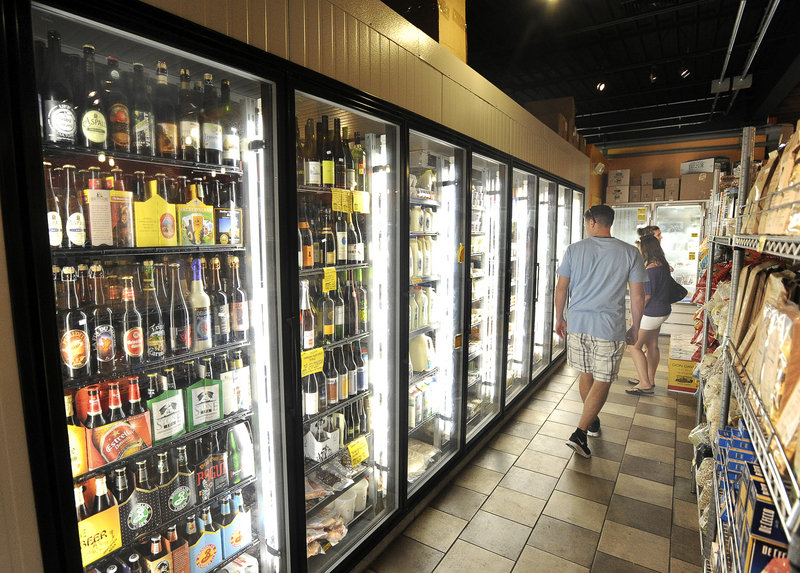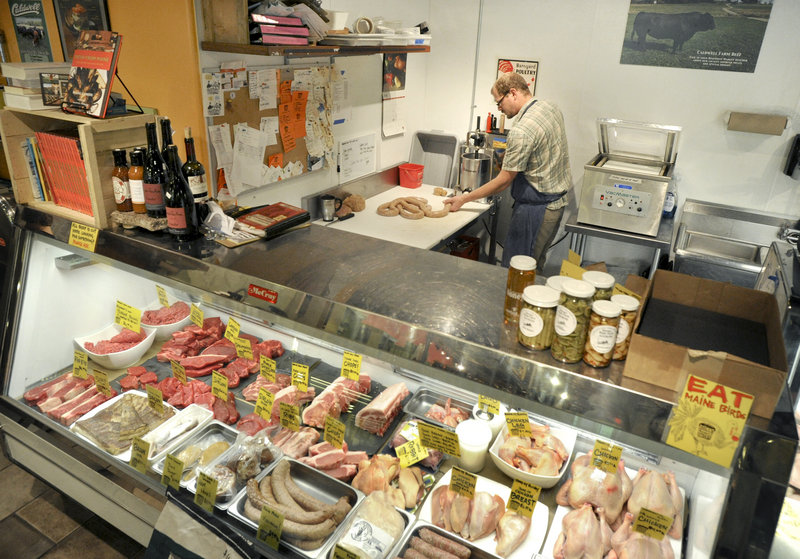The doors on the refrigerated cases at Rosemont Bakery and Market on Brighton Avenue in Portland contain energy efficient glass that doesn’t require heat to keep them from fogging up when opened.
The market’s head butcher, Jarrod Spangler, eschews all power tools on the job, and cuts all the meats and stuffs sausages by hand.
All of the food waste generated by the store goes to Valley View Farm in Auburn, where it is fed to pigs that eventually wind up in Rosemont’s meat counter.
Those practices and dozens of others won the market its recent certification as an environmental leader by the Department of Environmental Protection.
Being a green grocer has taken on new meaning in Maine through the DEP grocer certification process. Not only is Maine the first state to certify grocery stores and supermarkets that adopt green operating practices, but the process is helping food retailers save on operating costs.
“Over the past year we have cut down our waste from 10 to 12 (cubic) yards to four-and-a-half yards a week, which has cut our garbage bill down quite a bit,” said John Naylor, owner of Rosemont, which includes stores on Munjoy Hill and Yarmouth.
Rosemont is one of 10 food retailers to have attained the certification. Another 10 are in the process. Statewide energy savings and waste reduction figures for the program are not yet available.
The green-grocer effort is funded by a $200,000 grant from the U.S. Environmental Protection Agency. It is the latest addition to a DEP green business certification program that has become a model, adopted by two cities and eight other states, including New Hampshire and Connecticut.
“It allows us to meet the businesses where they are currently and provide them with assistance rather than for them to have to meet a daunting standard that might take them a while to achieve,” said Peter Cooke, assistant director of the DEP’s Office of Innovation and Assistance.
The program, which is free, offers grocers technical assistance to identify no-cost measures to help them reduce their environmental impact. The participants are awarded points for sustainable practices, such as using non-toxic cleaning products and reducing stormwater runoff. Independent grocers need 100 points and large chains 150 points to be certified.
Once that happens, stores must increase their points over the next two years to show they are systematically working to reduce their environmental impact. In exchange, they get a sticker and flag to display and are listed on various websites, such as the Maine Tourism Association’s www.greenmaine.net for vacationers who want to minimize their impact on Maine’s environment.
Hannaford Supermarkets has attained certification at four of its stores in Maine. George Parmenter, the chain’s corporate responsibility manager, said grocery stores are energy intensive by nature.
An average Hannaford store uses 2.5 million kilowatt hours of electricity annually, compared with 6,329 kilowatt hours for an average household customer of Central Maine Power. Each store generates about 10 tons of cardboard, food, plastic and paper waste per week, before recycling.
Parmenter said while it simply makes business sense to reduce environmental costs, the DEP program forces the company to take a hard look at its procedures in a very structured and formal way.
“We almost always learn new things about how we are executing those processes and where there are gaps. So there is a real benefit to the business for participating,” said Parmenter.
Market research shows environmental practices are good for business in other ways. Cooke cites a study commissioned by the Grocery Manufacturers of America that found more than half of all grocery store shoppers are influenced by the environmental attributes of products.
Doug Caldwell, a Rosemont market shopper, said he makes a point of patronizing environmentally-minded businesses. That is why he makes the trip into Portland from his home in Gorham to stock up on organic, locally grown pork.
“You can depend on it,” said Caldwell.
Maine’s tourism industry is also capitalizing on the growing number of green consumers. In six years, 118 businesses have been certified under DEP’s green lodging certification program, funded with a $30,000 EPA grant. Collectively, they are saving $1 million in energy costs, using 42 million gallons less water and recycling 3.4 million pounds of waste annually, including 26,000 pounds of plastic by switching to refillable shampoo and other amenity bottles, said Cooke.
That may explain why Maine restaurants approached DEP about starting a certification program of their own four years ago, funded by a $20,000 EPA grant. Today, 30 have attained certification.
“We have the stickers in our window,” said Louisa Edgerton, manager of Wild Oats Bakery and Cafe, one of four certified eateries in Brunswick.
Cooke said DEP is now piloting a green certification program for public schools.
Staff Writer Beth Quimby can be contacted at 791-6363 or at:
bquimby@pressherald.com
Send questions/comments to the editors.





Comments are no longer available on this story